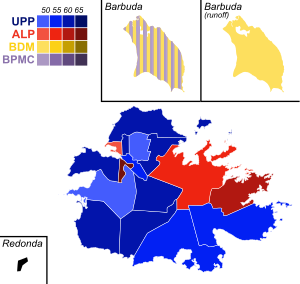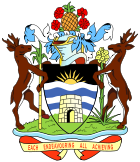You can help expand this article with text translated from the corresponding article in Spanish. (March 2024) Click [show] for important translation instructions.
|
| |||||||||||||||||||||||||||||||||||||
All 17 seats in the House of Representatives 9 seats needed for a majority | |||||||||||||||||||||||||||||||||||||
|---|---|---|---|---|---|---|---|---|---|---|---|---|---|---|---|---|---|---|---|---|---|---|---|---|---|---|---|---|---|---|---|---|---|---|---|---|---|
| Turnout | 91.19% ( | ||||||||||||||||||||||||||||||||||||
| |||||||||||||||||||||||||||||||||||||
 Results by constituency | |||||||||||||||||||||||||||||||||||||
| |||||||||||||||||||||||||||||||||||||
 |
|---|
General elections were held in Antigua and Barbuda on 23 March 2004. The result was a victory for the opposition United Progressive Party (UPP), which defeated the incumbent Antigua Labour Party. Baldwin Spencer, leader of the UPP, replaced Lester Bird as Prime Minister of Antigua and Barbuda, with Bird being one of eight Labour MPs to lose his seat. Spencer became only the second Prime Minister from outside the Bird family or the Labour Party.
Bird had been Prime Minister since 1994, when he succeeded his father, Vere Bird, who had been Prime Minister from independence in 1981, having previously served as Chief Minister or Premier of Antigua since 1960 with the exception of the 1971–1976 period.


